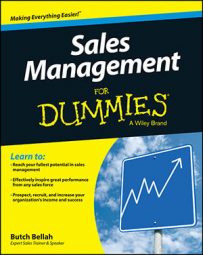As a manager, you should be managing your sales team and their performance every day — not just when it's time to do performance reviews. Don't look at the performance review as your one chance to talk to team members and either praise positive behavior or critique and analyze negative patterns. Monitoring performance is an ongoing process that happens daily.
Ongoing feedback — both positive and negative — is evident in the interactions and conversations you have with your people when you're actually managing and promoting the results you want and assisting your salespeople in getting out of the bad habits that produce the results you don't.
By providing regular feedback you prevent them from straying too far off track before receiving input. If you wait until they're too far gone for help, you haven't done your job.
Make it a point to talk to every person on your sales team on a regular basis, if for no other reason than to find out what's happening in their world. Don't get stuck in the office. Many people's biggest issue with sales managers is that they sometimes get so caught up in their own world they forget to actually get out in the field periodically.
You need to see how things are for yourself so that you don't lose sight of what's happening with your sales teams.
Will upper management put demands on your time? Yes. Manage it well and communicate with your team even when you can't be physically present.
Communication with your team should be a given. And, that communication should be regular, consistent feedback on their performance. You need to have a relationship in which they can come to you or you go to them to discuss issues and solve problems while those problems are still solvable. Don't wait until the molehill becomes a mountain.
It is important to put your expectations in writing. In the event those expectations aren't met, you need to get that in writing as well. You need to decide what offenses constitute a written warning and make them known. Don't find yourself in the situation of issuing a written warning for something you'd give no notification was subject to a written warning.
Open the curtains and let your people see what's going on. Don't assume they know what behavior is and isn't acceptable.
Your policy should be in writing so everyone is treated the same, and you have protection in the event of legal issues. You are probably not a lawyer (and don't play one on TV) so consult your human resources or legal department if you have questions specific to your situation, company, or state.
This is a way to deal with bad behaviors. Always post the bad list of offenses and generally deal with them with:
First offense: Verbal warning
Second offense: Written warning
Third offense: Written warning and discipline up to and including termination
Obviously, some situations circumvent this process and lead to immediate dismissal. But, if you're not firing someone immediately, write down the behavior and what you did about it.
If you have to issue a verbal warning to someone, document that in writing immediately. Include the warning issued and the date and put it in his personnel file. That way, if you need to issue a written warning, you have proof you started with the first level.
Ultimately, giving warnings is all about consistency (that and covering your tail personally and corporately). Follow the same procedure for every person every time.
No matter whether it's your top salesperson or the guy who's barely hanging onto his job, if the behavior warrants a written reprimand, it has to happen. Period. You have to be consistent. And, whenever possible, have the person sign the document. If he refuses, make a note in his file that he refused to sign.
In today's lawsuit-happy environment, you can never be too careful, so document everything, and save every email and all correspondence. You never know when they will be needed.
Your HR department almost assuredly has an employee handbook that outlines everything from use of company property to sexual harassment. If you feel the need to go further and develop your own departmental addendum with issues that specifically address the sales department, seek help from HR or the legal department prior to publishing sales-specific standards.
After you publish company or sales department standards, you cannot change them without publishing an update. You can't give just a verbal notice if you decide to change the rules or the punishment after you set precedent in writing.
Once you put it in writing, anything you do regarding that should be in writing. That way, there's no question about when a written warning is needed and justified. It's not a subjective matter and one where you have any gray area to decide whether you should or shouldn't.
When you have to issue a warning in writing, always follow it up — in writing — with what you want the salesperson to do to correct the problem. Just like in your regular performance reviews, don't just point out the problem without offering a solution. Your written warning shouldn't be, "You did this wrong so I'm writing you up!" Any warning should include three pieces of information:
The issue involved
The date and details of the verbal warning issued previously
What the salesperson needs to do to correct the problem
If the offense is serious enough, also include that a future occurrence will result in discipline up to and including termination (if that's the case).
If someone has done something wrong three times, it shouldn't be a surprise to him to receive a pink slip.

